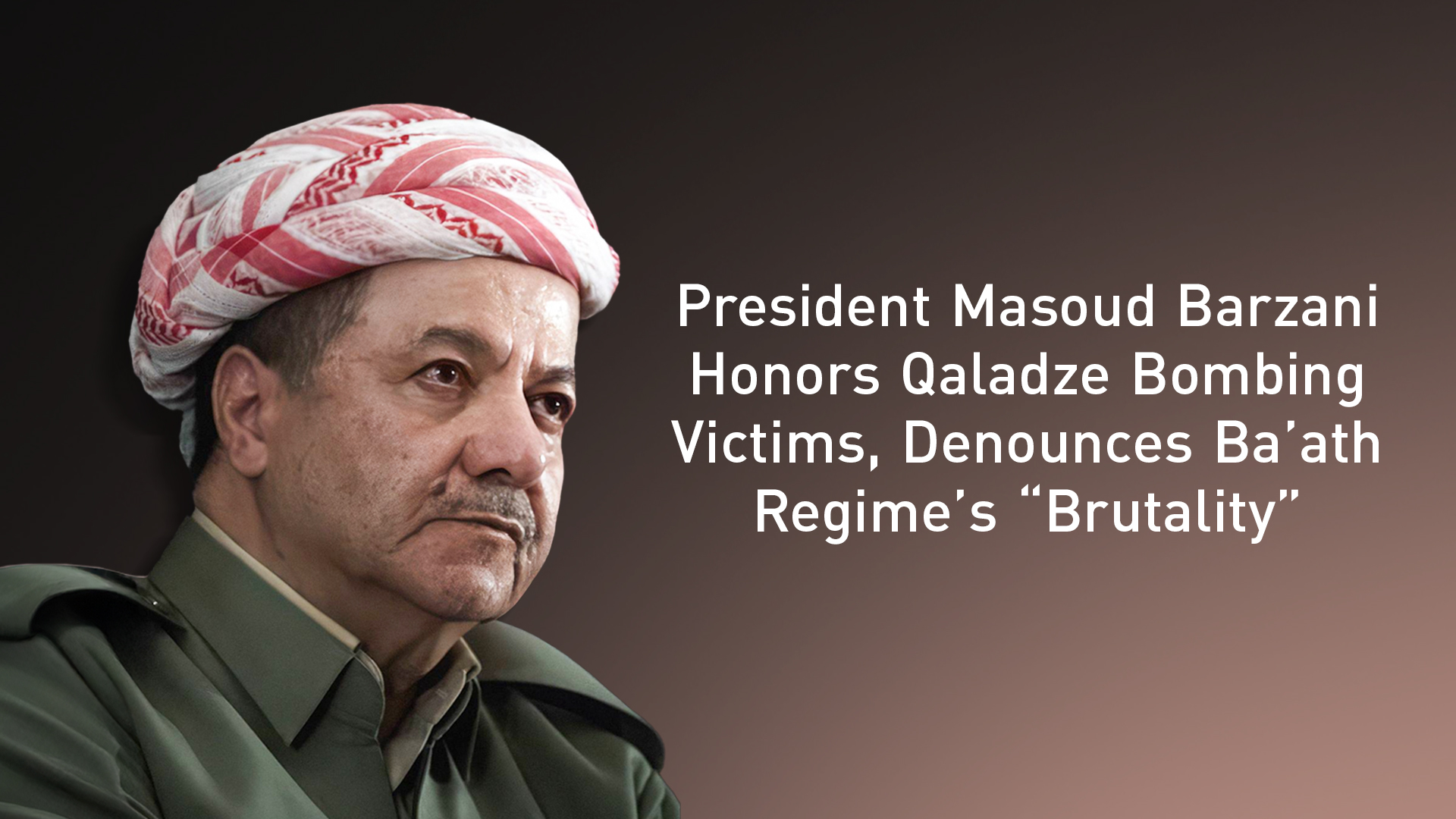President Masoud Barzani Honors Qaladze Bombing Victims, Denounces Ba’ath Regime’s “Brutality”
“That heartbreaking event remains another undeniable testament to the cruelty and shamelessness of Iraq’s former regime. It was a clear and deliberate crime against civilians, and it will never be forgotten.”

ERBIL (Kurdistan24) — On the 51st anniversary of the Ba’ath regime’s devastating bombardment of Qaladze and the University of Sulaimani, Kurdish leader, President Masoud Barzani, issued a solemn statement condemning the atrocity and honoring the memory of the martyrs and victims.
In a post shared on Thursday, on his official X account, President Barzani paid tribute to the lives lost in what he described as a blatant and unforgettable crime against innocent civilians.
“On the 51st anniversary of the Qaladze and University of Sulaimani bombing, we salute the souls of the martyrs and victims of that tragedy,” Barzani wrote. “That heartbreaking event remains another undeniable testament to the cruelty and shamelessness of Iraq’s former regime. It was a clear and deliberate crime against civilians, and it will never be forgotten.”
لە پەنجاویەكەمین ساڵڕۆژی تاوانی بۆردومانكردنی قەڵادزێ و زانكۆی سلێمانیدا سڵاو بۆ گیانی شەهیدان و قوربانیانی ئەو كارەساتە دەنێرین. ئەو ڕووداوە دڵتەزێنە بەڵگەیەكی ترە لە دڕندەیی و بێباكیی ڕژێمی پێشووی عێراق. تاوانێكی ڕوون و ئاشكرا بوو لە دژی خەڵكی مەدەنی و هەرگیز لەیاد ناكرێت.
— Masoud Barzani (@masoud_barzani) April 24, 2025
A Town and a Campus Turned to Rubble
The Qaladze bombing on April 24, 1974, remains etched in the collective memory of the Kurdish people. Ordered by Ba’athist regime, the airstrike targeted the town of Qaladze and the University of Sulaimani’s relocated branch. The university had been temporarily moved to Qaladze to shield it from growing tensions elsewhere, but it became the regime’s direct target in a brutal campaign of collective punishment.
The assault claimed the lives of dozens—primarily students, professors, and local residents—and wounded many more. The bombing was an early precursor to what would become a systematic campaign of repression against Kurds throughout Iraq during the Ba’athist era.
The University as a Symbol of Resistance
The University of Sulaimani, founded in 1968, was more than an academic institution—it was a symbol of Kurdish intellectual progress and national pride. Its relocation to Qaladze in 1974 was a decision driven by safety concerns amid rising Kurdish resistance. But the bombing transformed the campus into a graveyard, as classrooms were reduced to rubble and the lives of young scholars were abruptly extinguished.
A Broader Campaign of Repression
The Qaladze tragedy foreshadowed many of the horrors that would follow under Saddam Hussein’s rule: the 1988 Halabja chemical attack and the genocidal Anfal campaign, which killed over 180,000 Kurds. These events formed a brutal pattern of targeting the Kurdish population through both military means and state terror.
Though the international community has since recognized some of these crimes—such as Anfal—as acts of genocide, many incidents like Qaladze remain lesser-known outside the region despite their historical and emotional significance.
Ongoing Remembrance and Accountability
Each year, Kurdish leaders commemorate the Qaladze bombing as part of a broader effort to preserve the truth of their historical suffering and to honor the sacrifices of past generations. President Masoud Barzani’s statement this year serves as both a remembrance and a condemnation, reaffirming the Kurdish people's refusal to forget the atrocities committed against them.
“These are not just memories,” said a political science professor at the University of Sulaimani, “they are reminders of why our struggle for justice, autonomy, and dignity continues.”
Barzani’s message echoes a broader sentiment shared across Kurdistan—an enduring commitment to never allow the victims to fade into history, and to ensure that the world remembers what was done in Qaladze.
